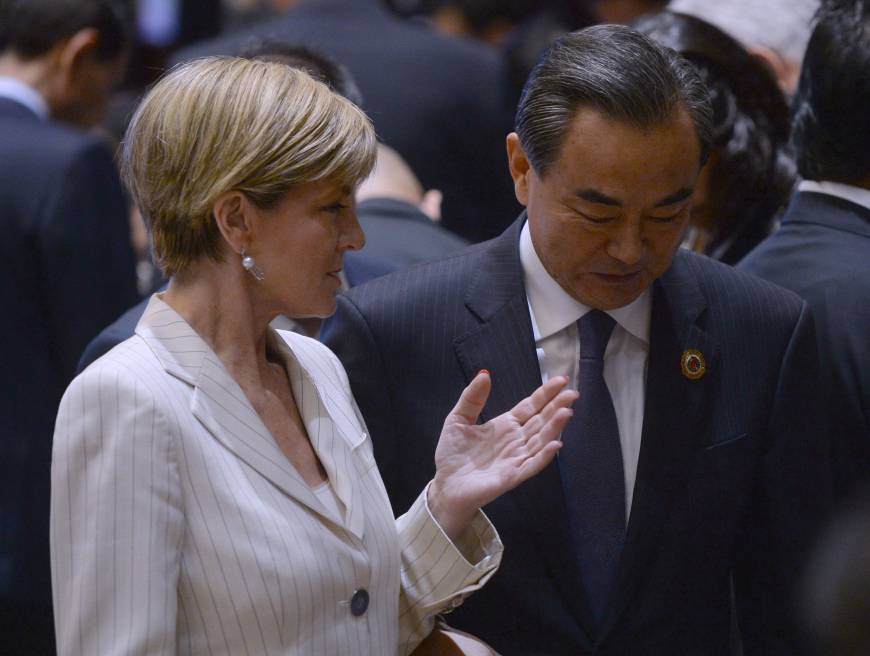Chinese state media calls Australia ‘an ideal target to strike’ in event of South China Sea patrol
BY JESSE JOHNSON
STAFF WRITER

Chinese state-run media has called Australia “an ideal target for China to warn and strike” if it ventures into the contested South China Sea.
The Global Times, known for its hard-line nationalist stance, blasted Canberra on Saturday in an editorial slamming its support for the July 12 ruling by an international arbitration tribunal at The Hague that invalidated China’s historical claims to much of the South China Sea.
Piling on insults, the paper called Australia a “country with an inglorious history. … at first an offshore prison of the UK. … established through uncivilized means, in a process filled with the tears of the aboriginals.”
The commentary also criticized Australia’s joint declaration with the U.S. and Japan last Monday, which urged China not to construct military outposts and reclaim more land in the disputed waters.
Linking statements condemning China’s moves in the waters to Australia’s alliance with the U.S., the editorial said that Canberra “also intends to suppress China so as to gain a bargaining chip for economic interests.”
“China must take revenge and let it know it’s wrong,” the commentary said. “Australia’s power means nothing compared to the security of China. If Australia steps into the South China Sea waters, it will be an ideal target for China to warn and strike.
“Australia is not even a ‘paper tiger,’ it’s only a ‘paper cat’ at best,” it added.
Beijing claims most of the South China Sea, through which more than $5 trillion in annual trade passes. Brunei, Malaysia, the Philippines, Taiwan and Vietnam all have rival claims.
It has also constructed man-made islands on some of the features it controls in the waters, on which it has built military-grade infrastructure, including airstrips and radar facilities.
The U.S. says China is militarizing its outposts in the waters, and Washington has conducted what it calls “freedom of navigation” exercises near Chinese-controlled islands.
While the U.S. has asked Australia and other nations to send warships within 12 nautical miles (22 km) of disputed territory in the South China Sea, Canberra has been reluctant to jeopardize ties with its biggest trading partner just over a year after the two inked a free trade pact.
The editorial apparently targeted these concerns, calling its support for the ruling a move “disturbing the South China Sea waters” and “surprising to many.”
Despite these worries, Australia has reportedly maintained patrols in and around the South China Sea as part of a the long-running Operation Gateway.
Operation Gateway is an Australian Defence Force deployment that traces its origins to the Cold War. It involves maritime surveillance patrols in the northern Indian Ocean and South China Sea.
Last November, a British Broadcasting Corp. journalist flying on assignment in the South China Sea reportedly recorded a radio transmission by the pilot of a Royal Australian Air Force surveillance plane apparently in the waters addressing the Chinese Navy.
According to Euan Graham, director of the International Security Program at the Lowy Institute in Sydney, this weekend’s commentary “ratchets up the insulting, menacing rhetoric by several notches.”
“The editorial should be called out by public commentators for what it is: bullying. A crude, cajoling attempt at intimidation,” Graham said. “Hopefully it will waken up some people in Australia to the dark side of China’s chauvinism, though it may simply reinforce the views of those already inclined to see ‘entrapment’ in the U.S. alliance as the greater risk to Australia’s security.”
Still Graham said China must be judged by its actions rather than its words.
“It doesn’t merit an official response from Australia, though in the days to come some message of alliance reassurance from the U.S. might be welcomed here,” he said.
No comments:
Post a Comment
Comments always welcome!